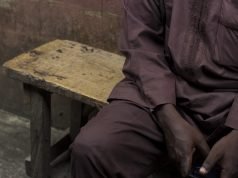By Kemi Falodun—
On Natives by Inongo-vi-Makomè
Originally written in Spanish and translated to English by Michael Ugarte, the story centres on the themes of migration, colonialism, poverty, racism, gender, sex and love. It is about the callous treatment of immigrants in Europeans countries, it is about women who are made to be subject of their societies and suffer social prejudice, it is about Africa, it is about us.
The story, set in Barcelona, begins with two Catalan women in their late forties who, despite their wealth and influence, lead frustrated love and sex lives. Roser is the nonchalant divorcee and Montse, the backbone of the duo has never been married. After being in the same rudderless ship for a long time trying to devise means to end their plights, Montse finally comes up with the idea of employing a man whose sole duty is to fulfil their sexual fantasies. He will be disguised as a butler or an employee who does “odd jobs.” Roser, the often pessimistic one, reluctantly agrees to Montse’s plan.
The experiences of Montse and Roser resonate with everyday realities of women in many societies; their fears, needs, desires, and limitations.
Bambara Keita is just another human being who is looking for means, any means possible, to survive. People leave their countries with hope of a better life, until reality begins to rot the edges of their glistening expectations. They cannot return to Africa in their present social and financial status, so they are left with no choice but to accept whatever life decides to squeeze into their palms. Bambara gets employed by Montse and Roser, and does everything in his power to satisfy them, despite being detrimental to him:
“All the tests came back normal, but the doctor, just to acquiesce, prescribed vitamins for him. Bambara took them secretly. He never took them to either of his bosses’ homes. He didn’t want to show the least bit of weakness.”
His politeness and cautiousness cannot go unnoticed. These lines from Mbella Sonne Dipoko’s timeless novel on immigration, A Few Nights and Days, quickly comes to mind:
“I knew that wasn’t exactly true. But politeness was a mass attitude. It didn’t take the individual into consideration, or susceptibility. Politeness saved the individual from being unnecessarily hurt. But its language was ready-made clothes. Even worse. They saved trouble and time. But they fitted badly sometimes.”
These words best describe Bambara Keita’s attitude towards his employers. On one side, the story can be seen as sexual freedom on the part of the women at the expense of a man’s pride, in this case, Bambara Keita. Most men from patriarchal societies would have seen the exploitative undertones in this arrangement, but time and circumstances have ways of reducing people to what they never imagined. There is also a side that attests to the issue of racism and gender inequality. Dating an immigrant in that society is certainly not one of Roser’s and Montse’s options. This lack of freedom, even in their own space, drives them to desperation. Under normal circumstances, nothing would have made these women share the same bed with the African. They deign to sleep him, because, well, they are not under normal circumstances. The three do their utmost to maintain surreptitiousness. Their anxieties come to rest. Everyone is happy.
Bambara Keita is a realistic representation of immigrants – who sometimes are seen as less human by some westerners because they feel they are superior to them, that they are by far superior to them. These immigrants flee their countries with the hope of finding “greener pastures,” but end up getting shamelessly exploited.
The story later takes on several twists as neighbours and family begin to suspect that Bambara is doing more than odd jobs for Montse and Roser. Also, Bambara’s conscientiousness, charming looks and sexual prowess begin to cause a stir between the two friends. They start to demand more than sex. He is then forced to weigh his options and make a difficult decision.
However, Natives has its own flaws. I understand Inongo’s attempt to talk about Africa by trying to reconcile Bambara’s African root and his present reality in Europe. Bambara keeps having memories of his childhood, anecdotes and stories told by his father and grandfather on how to deal with life’s trials. At some point, this begins to affect the fluidity of the narration, making the story drag and forced:
“‘Oh, yes. I happy. I say thank you. My father say’—That was the last straw for Roser. She did not let him finish. ‘Enough! No more about your father, or your grandfather!'”
Roser is not the only one who finds this tiring and excessively repetitive. It feels like the writer is trying to shove grit down your throat.
Another hole in the book is that Inongo did more telling, too much telling to his readers, than showing. This makes the story predictable. At a careful read also, one would notice some spelling errors which, of course, are avoidable.
The strengths of Natives lie in the easy comprehension and use of simple language. Still, it could have been better written.
Kemi Falodun is an associate web editor of Saraba magazine
Author image courtesy of inongovimakome.com
































